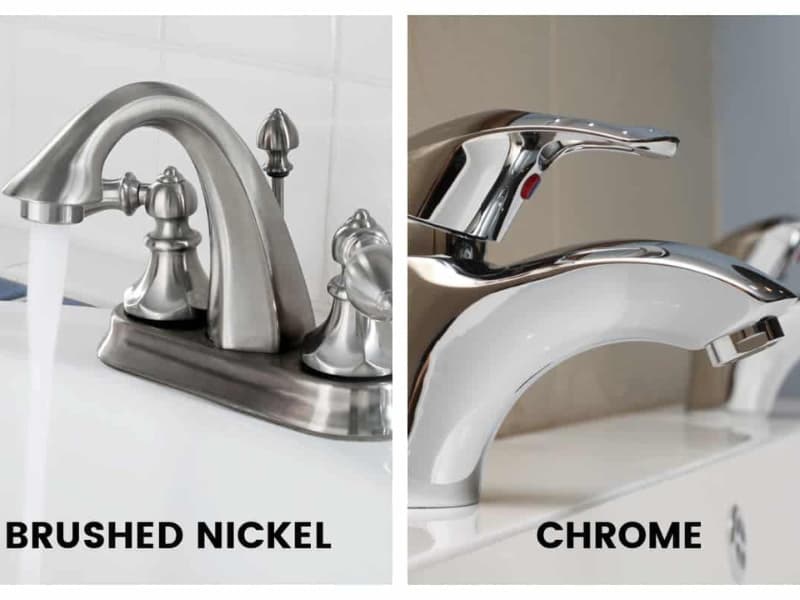Choosing between chrome and brushed nickel is difficult as your bathroom fixtures should match the room when you modify them. They should also be tough enough to last under the wet and humid conditions of the bathroom.
Chrome is to be brighter and more reflective, while brushed nickel has a more subdued sheen. Brushed chrome needs more upkeep, shows water and fingerprint blemishes more, and is less durable than brushed nickel. While chrome looks well with cooler tones, brushed nickel enhances warmer hues.
To choose between brushed nickel and brushed chrome, consider the cost, upkeep, and durability while comparing various styles. The fixtures in your bathroom should be attractive, practical, and low maintenance.
Both solutions meet the demands for distinct design and functionality. Whatever is best for your bathroom area, we can help you decide.

Differences between brushed nickel and brushed chrome
The main differences between brushed nickel and brushed chrome include the following:
1. Chrome is brighter
Between chrome and brushed nickel, the appearance of the metals is a crucial difference. Chrome is electroplated on the base metal; polished chrome is glossy and bright, reflecting light from its surface and making it brighter than brushed nickel.
Brushed nickel, however, has a more muted appearance and a slight matte finish due to using a wire brush to provide texture and reduce the sheen.
2. Brushed chrome looks well with cooler tones, while brushed nickel enhances warmer hues
Blues, greens, and pale purples are just a few fantastic hue combinations that can be calming and revitalizing. A warmer color scheme with orange, red, and yellow hues, or a variety, typically gives off a cozier vibe.
Nickel has a natural yellow or white luster, whereas chrome plating gives metal a faint blue hue.
Although both are chilly colors, brushed nickel gives a warmer impression because of its muted texture.
3. Brushed nickel conceals water stains and fingerprints better
Kitchen and bathroom fixtures suffer from the wrath of fingerprints. The same goes for the little white stains when the water dries on metal surfaces. Thankfully, a brushed finish’s rough surface can effectively conceal these blemishes.
On the other hand, chrome tends to accentuate such common flaws, necessitating extra diligence to maintain its shine.
4. Chrome needs more upkeep
Since chrome is a softer, more easily scratched metal than its more matte rival, it needs a little more care. Avoid using abrasive scrubbers like steel wool and chemical cleansers like bleach and ammonia-based solutions when cleaning.
Use gentle cleaning tools, such as a cotton towel or non-abrasive sponge, while applying. Chrome polish will increase the shine, but follow the manufacturer’s instructions carefully.
5. Brushed nickel provides a more durable finish
One of the toughest possible finishes, brushed nickel tends to maintain its aesthetic longer than chrome. A metal brush is used to etch the finish, giving it a matte sheen, and then a lacquer is applied to shield it from abrasion. Over time, improper cleaning may cause wear.
Avoid using abrasive cleansers that can damage the matte finish and harm brushed nickel; use gentle solutions and cloths or soft sponges instead.
Similarities between brushed nickel and brushed chrome
Here are a few similarities between the two:
1. Brushed chrome is cheaper than brushed nickel
Even though it frequently appears in high-end projects, chrome has long been considered the least expensive finish. There isn’t much of a price difference between polished nickel and brushed nickel today, despite polished nickel once being sold at a somewhat higher price range.
The manufacturer and fixture style are two factors that affect the price. Yet, compared to other finishes like polished brass and oil-rubbed bronze, both choices are considerably cheaper.
2. Both chrome and brushed nickel are resistant to corrosion.
Although brushed nickel and chrome are tough finishes, how well they are applied to the metal and how well they are maintained can affect how long they last.
Which is better for the bathroom?
Brushed nickel and chrome are frequently referenced in the same sentence. The yin and yang of bathroom sink fixtures, if you will.
Compared to brushed nickel, the glossy, brilliant chrome finish will more readily display fingerprints and watermarks. Also, brushed nickel is less reflective and less revealing of surface contamination, and thus, chrome must be towel-dried after cleaning to achieve its full brilliance.
We hope to have eased the decision-making process for you; good luck.
